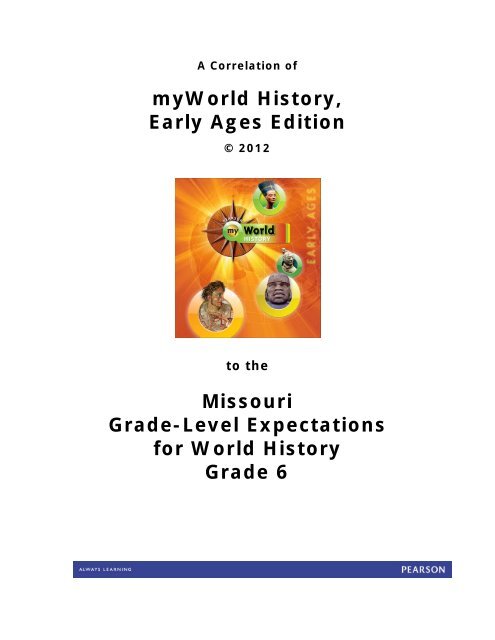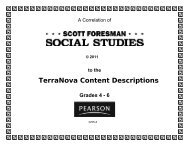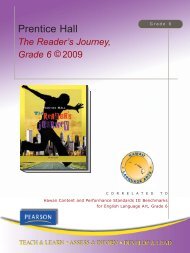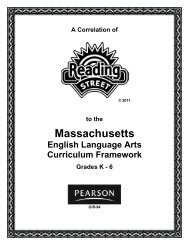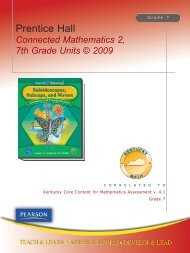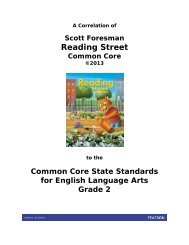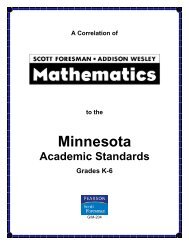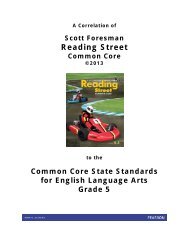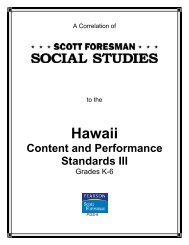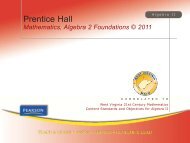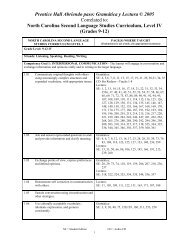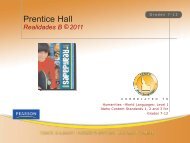myWorld History, Early Ages Edition - Pearson
myWorld History, Early Ages Edition - Pearson
myWorld History, Early Ages Edition - Pearson
Create successful ePaper yourself
Turn your PDF publications into a flip-book with our unique Google optimized e-Paper software.
A Correlation of<strong>myWorld</strong> <strong>History</strong>,<strong>Early</strong> <strong>Ages</strong> <strong>Edition</strong>© 2012to theMissouriGrade-Level Expectationsfor World <strong>History</strong>Grade 6
<strong>myWorld</strong> <strong>History</strong>, <strong>Early</strong> <strong>Ages</strong> © 2012to theMissouri Grade-Level Expectations – World <strong>History</strong>Grade 6INTRODUCTIONThis document demonstrates how <strong>myWorld</strong> <strong>History</strong> © 2012 <strong>Early</strong> <strong>Ages</strong> <strong>Edition</strong> meets theobjectives of the Missouri Grade Six Grade-Level Expectations for World <strong>History</strong>. Correlationpage references are to the Student and Teacher’s <strong>Edition</strong>s.• Welcome to <strong>myWorld</strong> <strong>History</strong>! Take your classroom on a virtual explorationthrough history with this exciting, new, digitally-robust social studies program from<strong>Pearson</strong>.• <strong>myWorld</strong> <strong>History</strong> engages 21 st century learners by integrating <strong>myWorld</strong><strong>History</strong>.comand the Student <strong>Edition</strong> with the goal of connecting history to their lives today.• Connect Watch your students connect to engaging stories from some of the mostcompelling and eventful times in the history of our world through myStory.• Experience Students will journey through time without leaving the classroom with<strong>myWorld</strong><strong>History</strong>.com where they will actively experience the history of the world inwhich they live.• Understand Informal and formal assessment options, both in print and online,provide students with multiple ways to demonstrate mastery of important concepts.Units found in <strong>myWorld</strong><strong>History</strong>.com & <strong>myWorld</strong> <strong>History</strong> <strong>Early</strong> <strong>Ages</strong> <strong>Edition</strong>:Unit 1: OriginsUnit 2: The Ancient Near EastUnit 3: Ancient India and ChinaUnit 4: Ancient GreeceUnit 5: Ancient RomeUnit 6: The Byzantine Empire and Islamic CivilizationUnit 7: African and Asian CivilizationsUnit 8: Civilizations of the AmericasUnit 9: Europe in the Middle <strong>Ages</strong>Unit 10: The Rise of EuropeSE = Student <strong>Edition</strong>2TE = Teacher <strong>Edition</strong>
<strong>myWorld</strong> <strong>History</strong>, <strong>Early</strong> <strong>Ages</strong> © 2012to theMissouri Grade-Level Expectations – World <strong>History</strong>Grade 6Missouri Grade-Level Expectations forSocial Studies, Grade 6World <strong>History</strong><strong>myWorld</strong> <strong>History</strong>, <strong>Early</strong> <strong>Ages</strong> <strong>Edition</strong>,© 2012CONCEPTS2b. Knowledge of continuity and change in the history of the world (World <strong>History</strong>)GRADE 6A. (1) Culture of early river valley civilizationsExamine river civilizations including:• Ancient Egypt in North Africa (pyramids andmathematics)SE/TE: 110-191• India (religions and culture) SE/TE: 196-249• Mesopotamia (beginnings of civilization) SE/TE: 106-139• China (technological advances) SE/TE: 250-293, 512-543B. (2) Contributions of Greek and Roman civilizationsDistinguish between Greek civilization and the Roman Empire regarding:• origins of democracy SE/TE: 312-317• rule of law SE/TE: 300-323, 360-381• governmental structures SE/TE: 300-323, 360-381C. (3) Institutions and events of European civilization during the Middle <strong>Ages</strong>Investigate Europe in the Middle <strong>Ages</strong>, including:• rise of kingdoms SE/TE: 624-633• feudalism SE/TE: 640-647• the Crusades SE/TE: 664-677, 702-703D. (4) Japanese institutions and cultureInvestigate Feudal Japan, including:• rise of war lords SE/TE: 554-561• art SE/TE: 562-564, 569E. (5) Native Latin American culturesExamine and compare the Mayan, Aztec andIncan culturesF. (6) Cultural features of the historicAfrican EmpiresInvestigate African Empires, including:• agriculture, arts, gold production and thetrans-Saharan caravan tradeSE/TE: 578-607, 616-621SE/TE: 484-511SE/TE: 484-493• spread of Islam into Africa SE/TE: 494-499SE = Student <strong>Edition</strong>3TE = Teacher <strong>Edition</strong>


